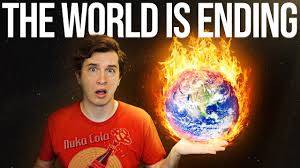"The Day the World Will End"
Predictions about the end of the world have long fascinated humanity, blending science, speculation, and imagination. However, scientists generally approach the question of Earth's "end" through evidence-based reasoning, often looking billions of years into the future. This timescale renders any immediate doomsday scenarios as speculative rather than scientific.
The Sun's Death: A Predictable End
Astronomers estimate that the Earth will likely meet its demise due to the natural life cycle of the Sun. Our Sun is about 4.6 billion years old, and its total lifespan is expected to be around 10 billion years. This means that in roughly 5 billion years, the Sun will exhaust the hydrogen fuel in its core. At that point, it will swell into a red giant, likely engulfing the inner planets, including Earth, in its outer layers. Before this dramatic transformation, the Sun's increasing luminosity over billions of years will gradually make Earth uninhabitable. Within the next billion years, the rising temperatures could evaporate Earth's oceans and strip away its atmosphere, effectively ending life as we know it.
Collision with the Andromeda Galaxy
Another scientifically predicted event is the collision between our Milky Way galaxy and the Andromeda galaxy. This collision is expected to occur in about 4–5 billion years. While such an event won't directly destroy Earth, it could significantly alter the solar system's position and dynamics, potentially ejecting Earth from its stable orbit. This disruption could render the planet inhospitable, though it's more likely that humanity will have moved beyond Earth by then.
The Heat Death of the Universe
Looking beyond Earth, cosmologists theorize the universe will eventually reach a state of "heat death" or maximum entropy. This would happen trillions of years from now, when all stars have burned out, and no usable energy remains. While this scenario is far beyond the concerns of Earth-bound civilizations, it represents the ultimate endgame for all matter and energy in the cosmos.
Human-Induced Catastrophes
On shorter timescales, humans pose the most immediate existential risks to Earth and its biosphere. Climate change, nuclear war, and biodiversity loss are pressing concerns that could lead to widespread collapse of ecosystems and civilizations. While these scenarios might not end the planet itself, they could render it uninhabitable for humans and many other species.
Asteroid Impacts and Cosmic Threats
Asteroid impacts are another possibility, though large-scale collisions like the one that contributed to the extinction of the dinosaurs 66 million years ago are rare. Scientists actively monitor near-Earth objects (NEOs) to prevent such events. Other cosmic threats include supernovae, gamma-ray bursts, or rogue black holes, though the probabilities of these occurring near Earth are extremely low.
Conclusion
While the Earth's ultimate fate is tied to the Sun's life cycle, humanity's future depends on how we address current and foreseeable challenges. The billions of years before Earth's "natural" end leave plenty of time for technological advancement and exploration beyond our planet. Instead of fearing the far-off future, scientists urge humanity to focus on sustainability and stewardship, ensuring that life thrives for as long as possible.
"The End of the World: A Scientific Perspective on Earth's Final Days"



No comments yet
Be the first to share your thoughts!